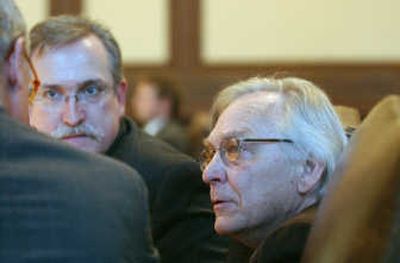Eugster attorney hopeful

OLYMPIA – No stranger to the state Supreme Court, Spokane attorney Steve Eugster on Thursday found himself in an unaccustomed place: on the sidelines.
Surrounded by about 10 supporters, the former Spokane city councilman watched as lawyers argued whether he should be suspended from practicing law. The state bar association wants to suspend Eugster while it finalizes its disbarment case against him for allegedly betraying an elderly client.
The court issued no immediate ruling. But judging by the reactions of several justices, Eugster’s full-court press to avoid suspension – including dozens of letters to the court from friends and attorneys – may work. Several justices seemed inclined to let Eugster continue work under another lawyer’s supervision. He said he has only three clients.
Justice Jim Johnson cited Eugster’s 38-year career with no prior discipline. Beside him, Justice Susan Owens visibly scoffed when bar association attorney John Burke mentioned an anonymous 2004 Spokane attorney poll. (It gave Eugster low marks for legal ability, temperament and integrity.) And Justice Charles Johnson seemed sympathetic to Eugster’s version of his dilemma: what to do when a client seems mentally impaired.
Seen by some as dogged defender of the public interest and by others as a litigious gadfly, Eugster faces possible disbarment over his treatment of Marion Stead, an 87-year-old Colville widow who hired him in 2004.
She was upset and suspicious of how her only child, Roger Samuels, was handling her financial affairs. But Eugster said she also badly wanted to see her son and wanted to include Samuels’ daughter in her will.
Eugster, a longtime acquaintance, concluded that nothing was amiss. But when he tried to reconcile the family, his relationship with Stead soured. She hired another attorney, Andrew Braff.
By then, Eugster says, he felt she couldn’t handle her own affairs. Trying to protect Stead, he says, he asked a court to appoint someone as guardian.
Stead was furious. The bar association says she spent $13,500 successfully staving off Eugster’s effort to have her found incompetent. Friends, health care workers, her investment broker and others all said she didn’t need a court-appointed guardian. She died in November 2006, two days after signing a new will. It left most of Stead’s $273,342 estate to her son’s ex-wife and an animal shelter. Braff, according to Eugster’s attorney Shawn Newman, filed a complaint with the state bar association.
In January, a bar association board unanimously recommended disbarment. It said Eugster failed to abide by his client’s wishes, used her secrets against her and filed the court case without asking experts about her mental capacity.
Eugster “put his own financial interests above that of a sick, elderly client to gain access to her money,” the bar association wrote to the high court. “He betrayed his client by exploiting the difficult relationship she had with her son, leaving her and her estate isolated from family oversight, and manipulated the judicial system for his own benefit.”
As further evidence that Eugster is hurting the profession, Burke cited Eugster’s frequent “frivolous lawsuits that are not based in law or in fact.”
At least one Supreme Court justice sounded uncomfortable with what Eugster did. Justice Barbara Madsen wondered aloud: Does the state really want fired lawyers to try to declare their former clients incompetent?
After the hearing, Burke said he couldn’t comment. But one of Eugster’s attorneys said he was encouraged.
“Normally, (suspension) is just a rubber stamp process,” Newman said.
Lawyers’ rules of professional conduct today would require Eugster to seek expert opinions about a client’s questionable competence, he said. But in 2004 they didn’t.
“They cited the wrong damned rule,” Newman said.
“They want to typecast Eugster as this stereotypical greedy attorney out to rip off this poor widow,” he said. But Eugster reduced his fee for Stead, withdrew as a trustee of her estate and didn’t want to be appointed guardian, Newman said.